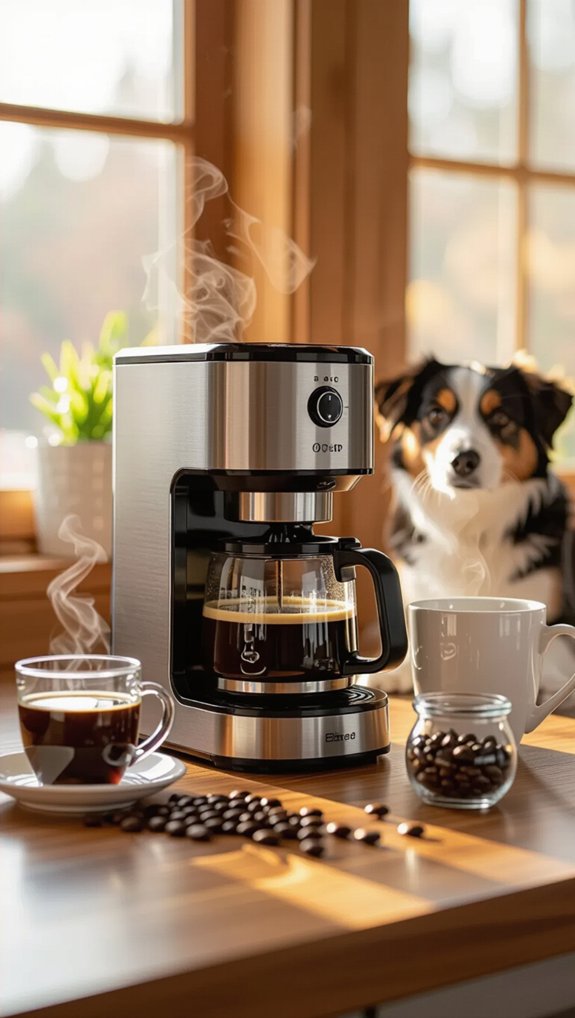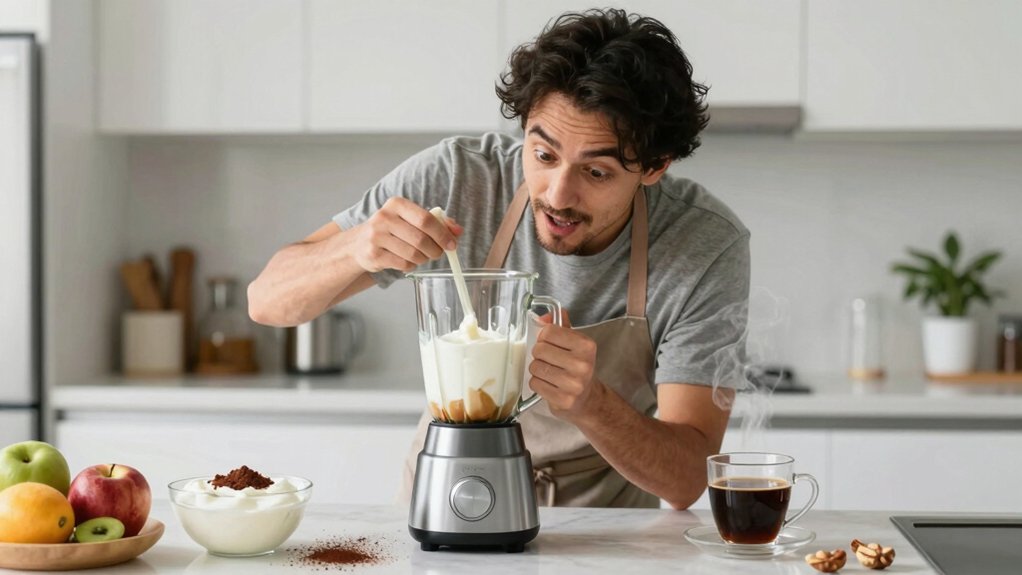According to the Pet Poison Helpline, caffeine toxicity accounts for approximately 10% of all pet poisoning cases in the United States, with coffee being one of the most common sources. The ASPCA Animal Poison Control Center reports that even 1-2 laps of coffee, or about 9mg of caffeine per pound of body weight, can be toxic to dogs. This alarming statistic becomes even more concerning when you consider that the average cup of coffee contains 95mg of caffeine, meaning a small dog could face serious health consequences from just a few sips.
Many dog owners wonder whether their morning coffee ritual poses a real threat to their pets, especially when their curious companions show interest in their drinks. The risks are genuine and can escalate quickly, ranging from mild restlessness to life-threatening conditions like cardiac arrhythmia and seizures.
In this post, you’ll discover the specific dangers coffee poses to dogs, learn to recognize the warning signs of caffeine poisoning, understand which coffee products are most hazardous, and find out exactly what steps to take if your dog consumes coffee. We’ll also cover prevention strategies to keep your pet safe while you enjoy your daily brew.
Table of Contents
Is coffee bad for dogs actually?
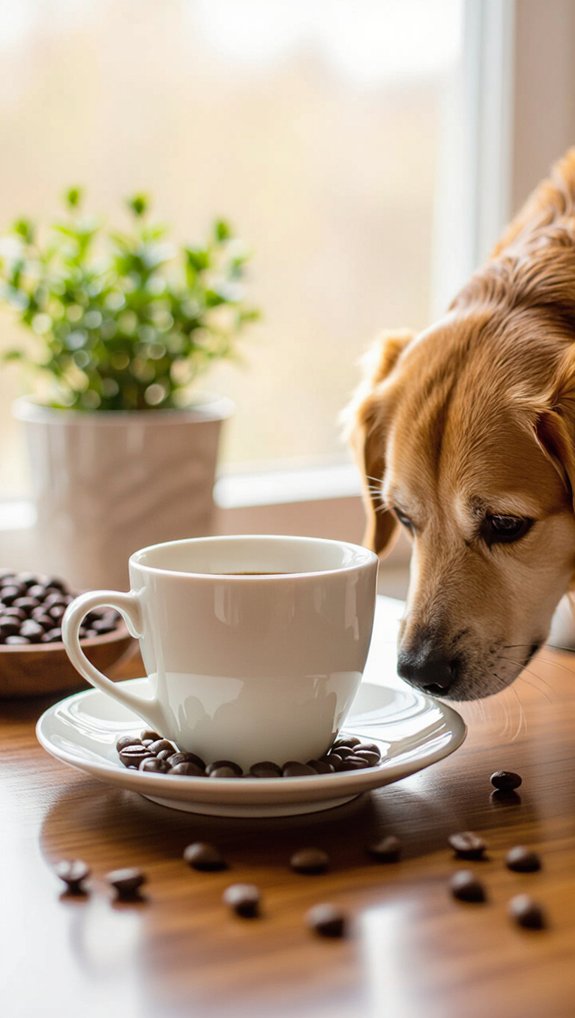
Yes, coffee is bad for dogs and can be extremely toxic, even in small amounts. The caffeine in coffee acts like a dangerous stimulant for canine metabolic systems, causing rapid absorption and potentially life-threatening complications. Veterinary toxicology research confirms that the metabolic differences between dogs and humans make caffeine absorption particularly dangerous for canines.
Dogs process caffeine much slower than humans, making even a few sips risky.
Caffeine impacts multiple organ systems, triggering serious symptoms like increased heart rate, seizures, and muscle tremors. Small dogs are particularly vulnerable, with toxic effects emerging quickly-sometimes within 30 minutes of ingestion.
The concentration of caffeine in coffee grounds is especially dangerous, posing an even greater threat to our furry friends.
What happens if my dog drinks coffee
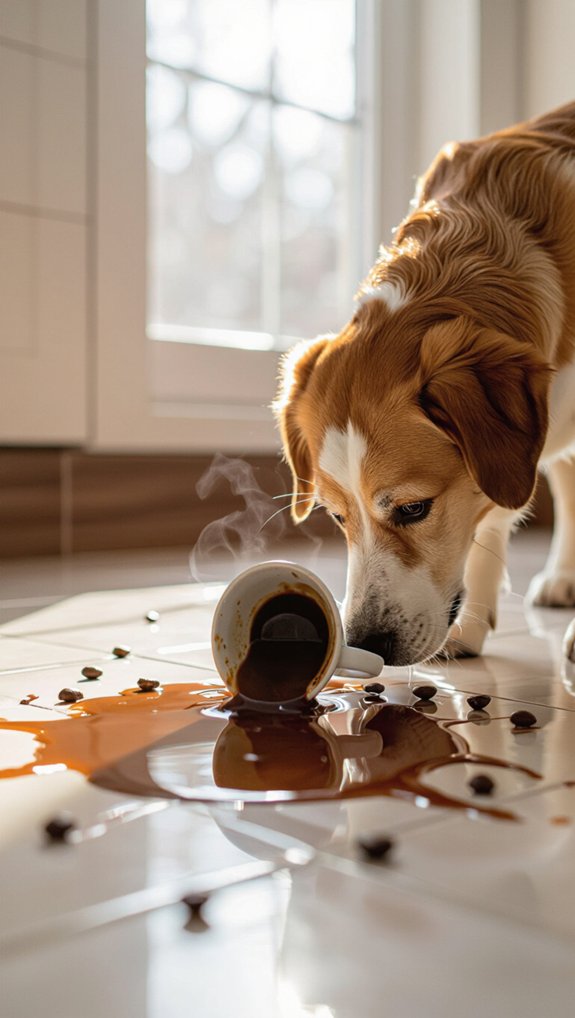
If your dog accidentally drinks coffee, they’ll likely experience rapid and potentially dangerous health complications that demand immediate attention. Metabolic differences make dogs uniquely vulnerable to caffeine toxicity, with their slower processing rates dramatically increasing potential harm.
The risks of caffeine for dogs include:
- Nervous system overstimulation
- Cardiovascular system disruption
- Severe neurological complications
- Gastrointestinal distress
- Potential life-threatening reactions
Symptoms typically emerge within 30-60 minutes, ranging from restlessness and rapid breathing to tremors and vomiting.
Small amounts can trigger significant health issues because dogs metabolize caffeine much slower than humans.
Theobromine compounds amplify toxicity, making even a few sips potentially dangerous.
Immediate veterinary care is crucial, as treatment might involve inducing vomiting, administering medication, and monitoring your pet’s condition for 24-48 hours to prevent severe complications.
How much caffeine harms a dog

While most dog owners might casually enjoy their morning brew, grasping caffeine’s toxic threshold could literally save their pet’s life.
Just 40 mg/kg of caffeine can trigger toxic reactions in dogs, with lethal doses ranging between 110-200 mg/kg.
Even small amounts-as low as 7-10 mg/kg-can cause severe symptoms.
A single cup of coffee (80-100 mg caffeine) could be dangerous for a small dog, while caffeine pills pose an even greater risk.
Smaller dogs are especially vulnerable, with their lower body weight amplifying caffeine’s harmful effects rapidly. Metabolic vulnerability increases the risk of serious health complications from even minimal caffeine exposure.
Signs your dog had caffeine today
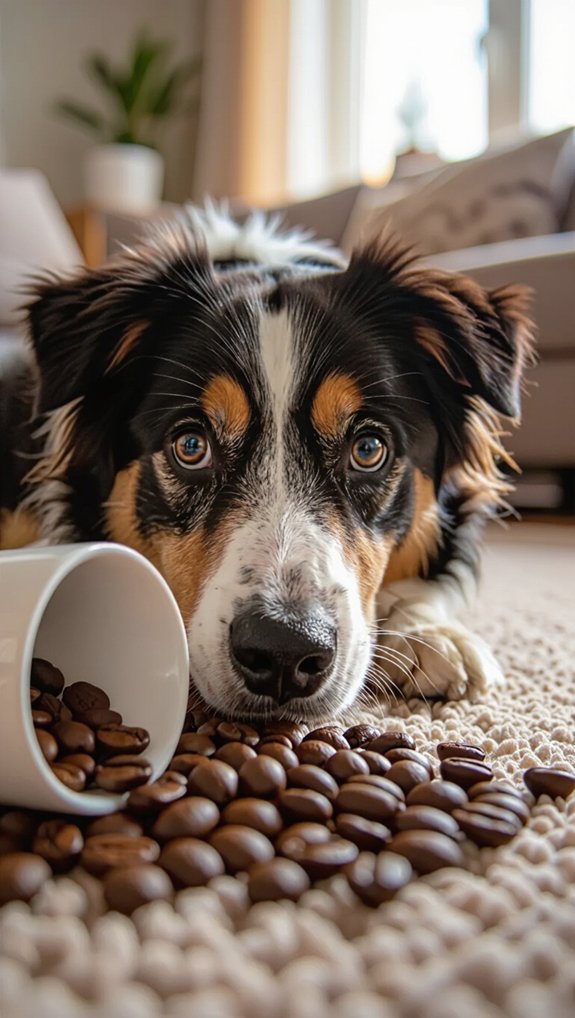
Dogs can quickly reveal caffeine exposure through a constellation of alarming symptoms that range from mild restlessness to potentially life-threatening neurological reactions.
- Hyperactive behavior and constant pacing
- Rapid heart rate and excessive panting
- Tremors and muscle shaking
- Repeated vomiting or diarrhea
- Unusual anxiety and vocalization
Watch for these warning signs within 30 minutes to 2 hours after potential caffeine ingestion. Small breeds might show symptoms faster and more intensely.
Peak toxicity occurs around 30-60 minutes post-exposure, with symptoms potentially lasting up to 72 hours. If you notice these signs, contact your veterinarian immediately for professional guidance and potential emergency intervention.
Coffee types that risk dogs more

When it comes to coffee risks for dogs, not all brews are created equal. Espresso shots and coffee grounds pack the highest caffeine punch, making them extremely dangerous.
Whole beans and used grounds are particularly toxic, with concentrated caffeine levels that can quickly poison your pup. Coffee-flavored products like ice cream and liqueurs compound the risk by adding chocolate, xylitol, and alcohol to the mix.
Even decaf isn’t safe-it still contains traces of caffeine and irritating compounds that can harm your furry friend. Always keep coffee far from your dog’s reach.
What to do right after ingestion
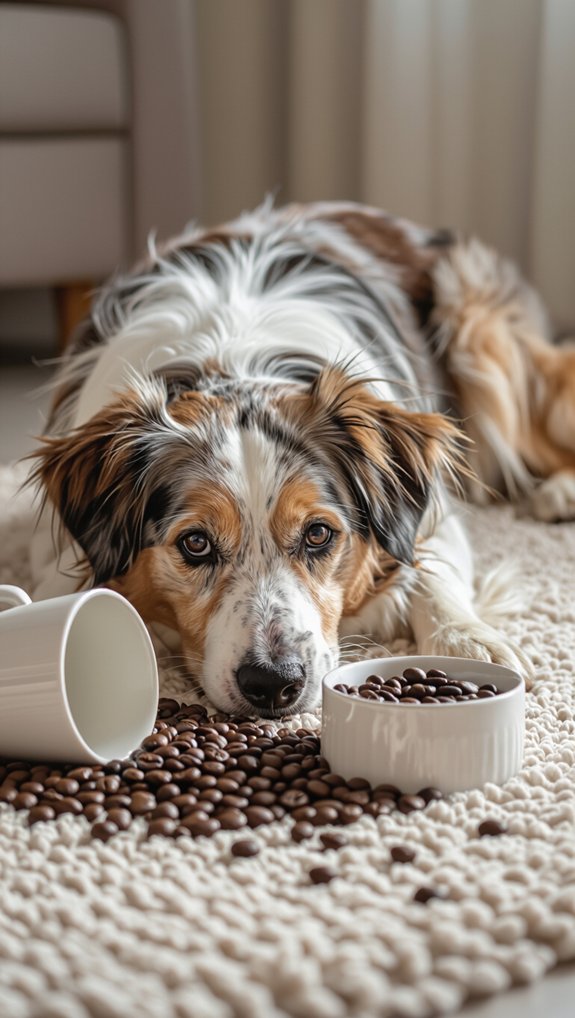
Panic can set in quickly when your dog accidentally ingests coffee, but knowing the immediate steps can be a lifesaver. Your priority is swift action to minimize potential caffeine toxicity risks.
Critical immediate steps include:
- Contact your veterinarian or Pet Poison Helpline at 1-800-213-6680 within minutes
- Collect and save coffee packaging for ingredient verification
- Note the exact time and amount of coffee consumed
- Prepare your dog’s weight and product details for professional consultation
- Monitor for early symptoms like restlessness and increased heart rate
Quick, informed response can significantly reduce potential health complications for your furry friend.
When to call the vet immediately
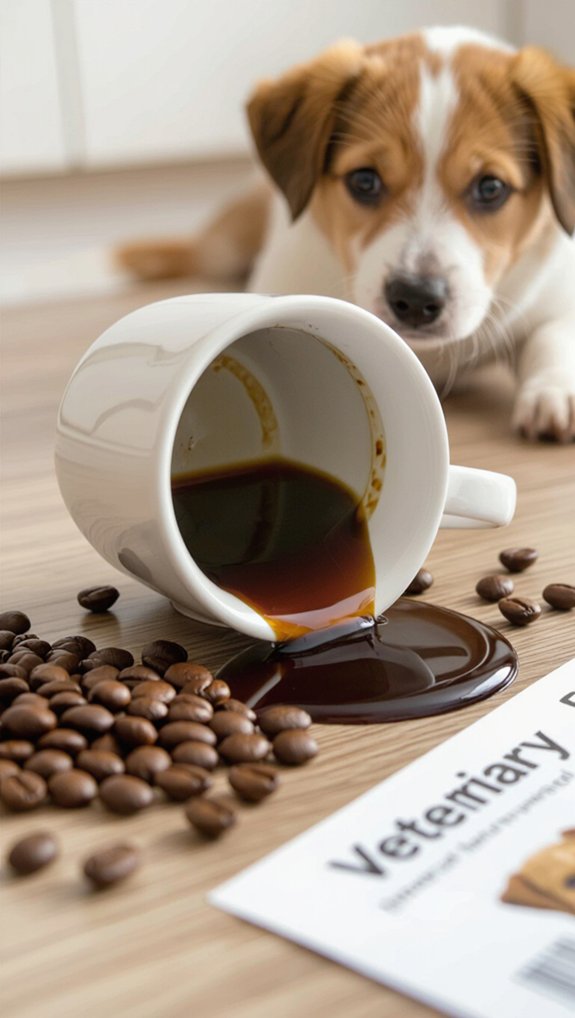
If your dog has ingested coffee, immediate veterinary contact becomes crucial when specific warning signs emerge that could signal potential caffeine poisoning. Watch for rapid onset symptoms like vomiting, tremors, seizures, and cardiovascular distress.
Urgent care is essential if you notice:
- Repeated projectile vomiting
- Behavioral changes
- Pale or discolored gums
- Excessive drooling
- Muscle twitching
- Difficulty standing
Small dogs and puppies are at higher risk, so don’t hesitate to call your vet at the first sign of trouble. Quick intervention can prevent serious complications or potential fatality.
Safer drink alternatives for curious pups
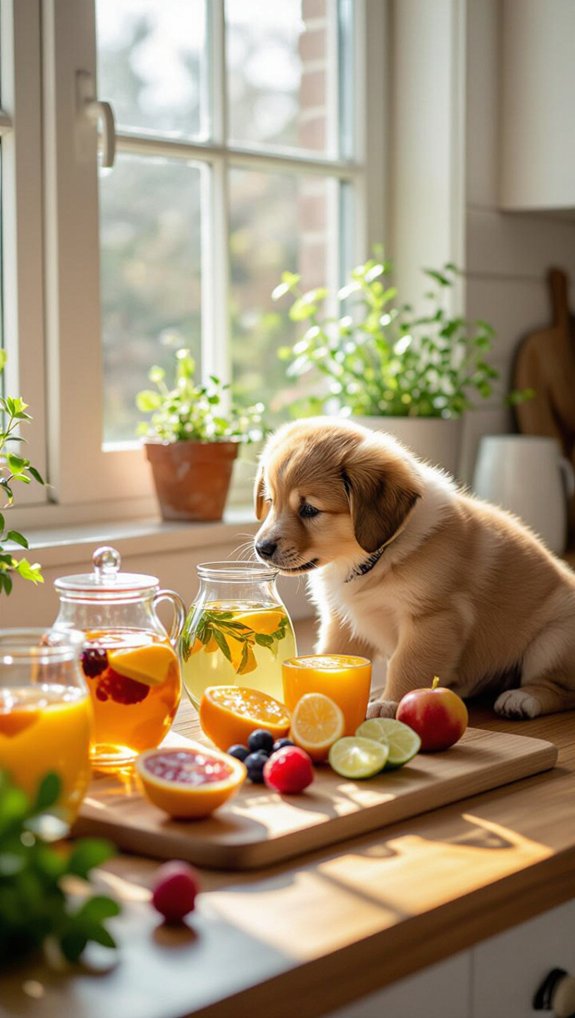
Coffee might be our morning lifeline, but for our four-legged friends, it’s a dangerous brew that can spell serious trouble. Instead, I’ve got some paw-friendly hydration options that’ll keep your curious pup safe and happy.
- Fresh water remains the ultimate hydration champion
- Low-sodium vegetable broth offers nutritious variety
- Unsweetened coconut water provides natural electrolytes
- Pedialyte helps with dehydration recovery
- Caffeine-free herbal teas can soothe and support
These alternatives aren’t just safe-they’re delicious and beneficial. Always introduce new drinks slowly and consult your veterinarian to ensure your dog’s optimal health and hydration.
Keep coffee away with simple habits
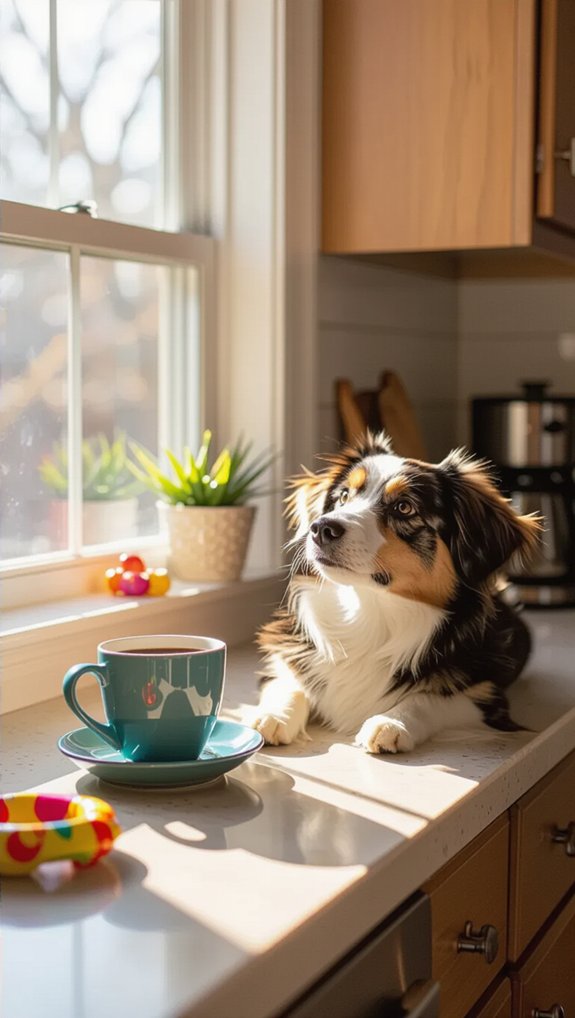
Protecting our curious canine companions from coffee’s hidden dangers requires proactive household management and smart storage strategies.
Coffee myths and facts for owners

Dogs and coffee don’t mix-period. Caffeine is toxic to our furry friends, no matter how small the amount.
- Coffee contains dangerous methylxanthines that rapidly absorb in dogs
- Even tiny doses can trigger severe neurological and cardiovascular reactions
- Symptoms range from tremors and hyperactivity to fatal cardiac complications
- Coffee grounds are more concentrated and dangerous than brewed coffee
- Bitterness won’t deter dogs from consuming potentially lethal caffeine
As a coffee expert, I’ve seen countless misconceptions about pets and java. The science is clear: keep your coffee far from your canine companion to prevent potentially life-threatening poisoning.
Frequently Asked Questions
Can Dogs Develop a Coffee Addiction Like Humans?
Yes, dogs can develop a caffeine dependence. Their bodies respond to repeated exposure, building tolerance like humans, but I strongly warn against intentionally giving them coffee due to severe health risks.
Do Different Dog Breeds React Differently to Caffeine?
Yes, different dog breeds react uniquely to caffeine. Small breeds are far more sensitive and at higher risk, while larger dogs might tolerate small amounts better. Individual health, age, and body weight significantly influence their caffeine response.
How Long Does Caffeine Stay in a Dog’s System?
Based on the background information, caffeine can stay in a dog’s system for 13-20 hours, with metabolites potentially persisting for days. The half-life is 4.5 hours, and symptoms can last up to 36 hours depending on the ingested dose.
Are There Any Long-Term Effects From Accidental Coffee Exposure?
Yes, coffee exposure can cause long-term health risks for dogs, including potential organ damage, neurological issues, and cardiovascular stress. If your dog’s ingested caffeine, I’d recommend immediate veterinary consultation to minimize possible lasting complications.
Can Coffee Impact My Dog’s Behavior or Mood?
Yes, coffee can drastically alter my dog’s behavior. I’ve learned it causes hyperactivity, anxiety, and agitation by overstimulating their nervous system. My dog might become jittery, restless, and even aggressive after accidentally consuming caffeine.
In Conclusion
Coffee is indeed harmful to dogs, and understanding this risk is essential for every pet owner asking “is coffee bad for dogs?” The answer is an unequivocal yes-even small amounts of caffeine can cause serious health complications including seizures, rapid heart rate, and tremors in your canine companion. Prevention starts with vigilant storage of all coffee products and educating your entire household about these dangers.
If your dog accidentally ingests coffee, time is critical. Contact your veterinarian immediately with specific details about what type of coffee and how much your pet consumed. While you’re taking steps to keep your furry friend safe, consider exploring coffee machines with built-in safety features that minimize spill risks. Our coffee machine reviews highlight options that combine convenience with pet-friendly design considerations.
Remember, responsible pet ownership means being proactive about potential hazards in your home. Keep coffee beans, grounds, and brewed beverages securely stored away from curious paws, and never leave your morning cup unattended where your dog can reach it.

